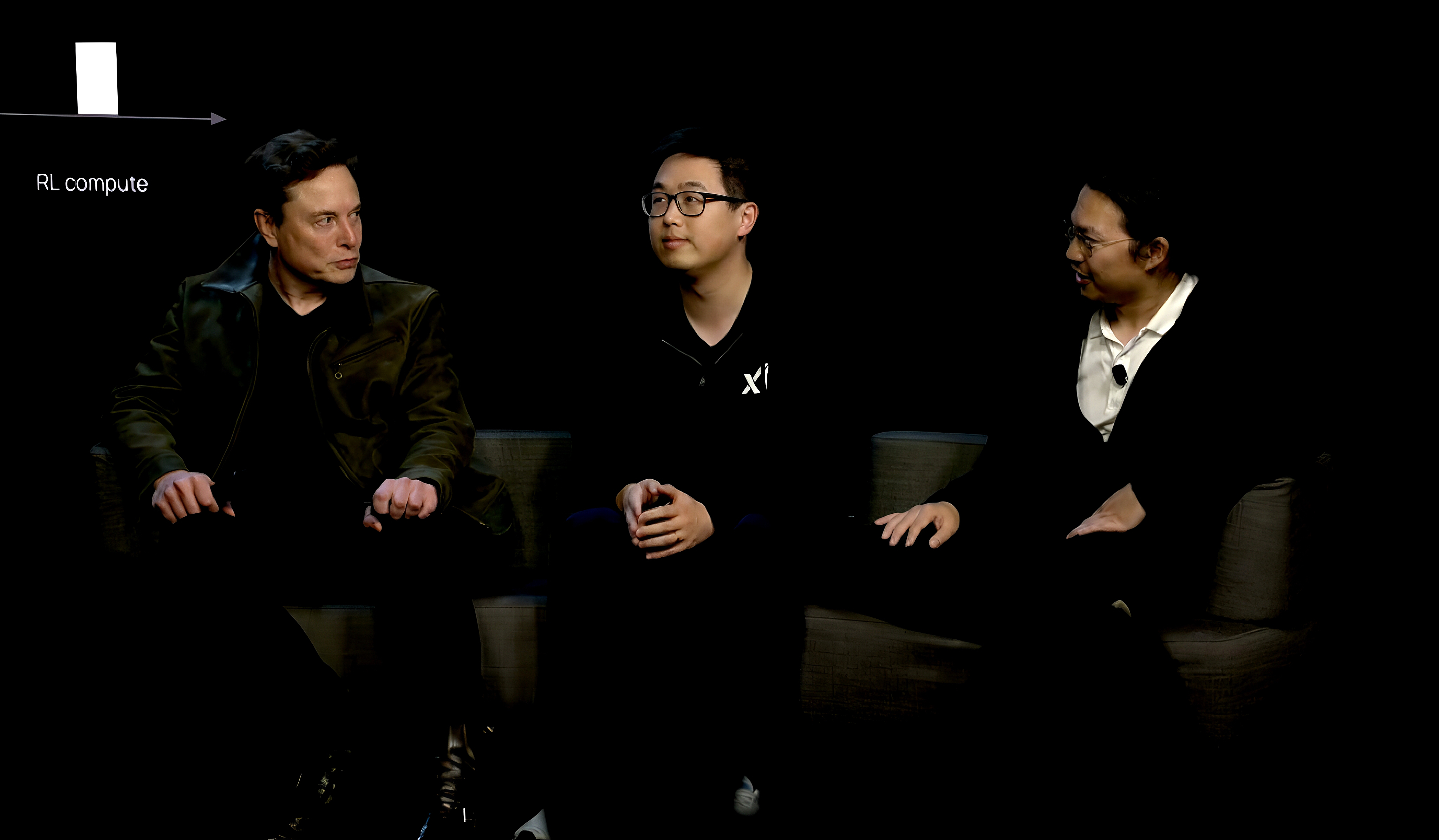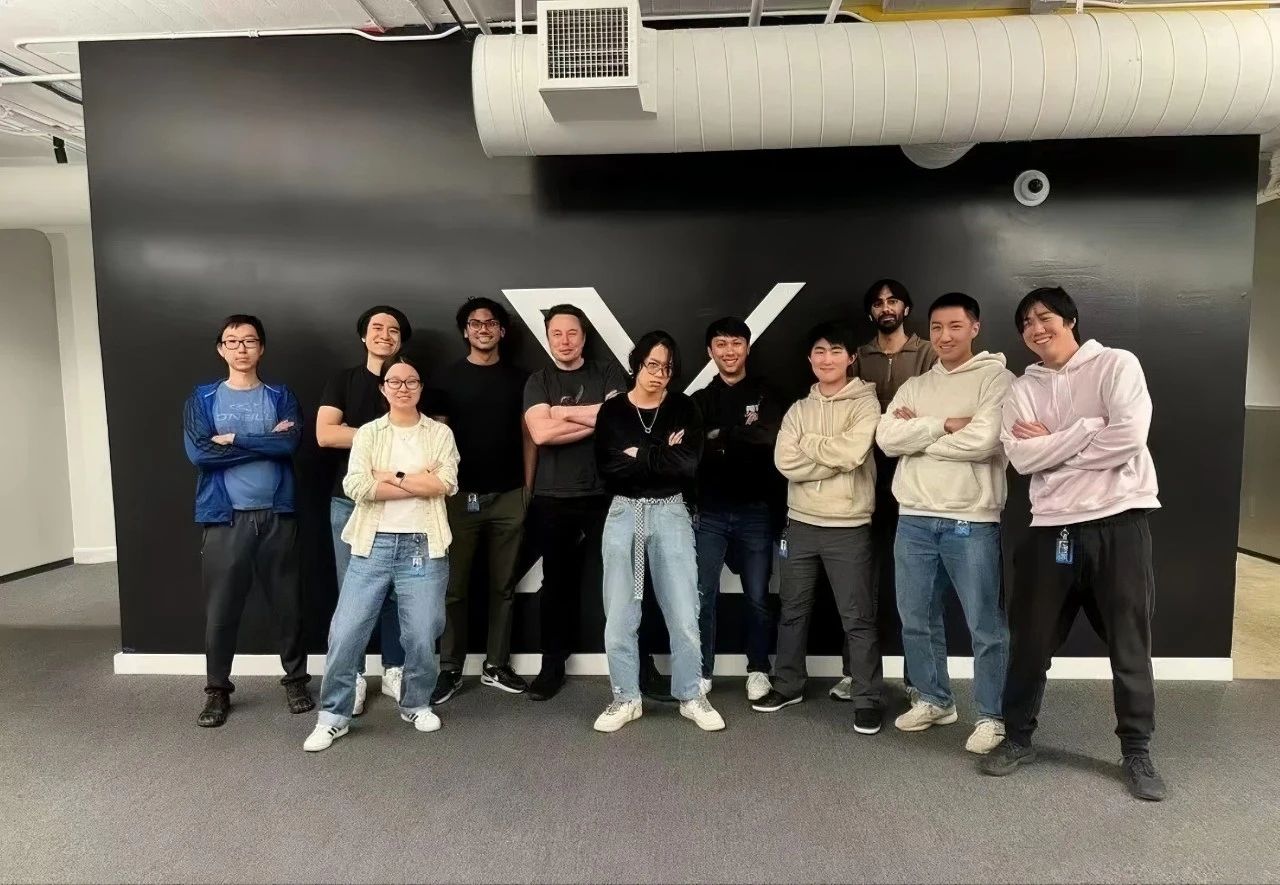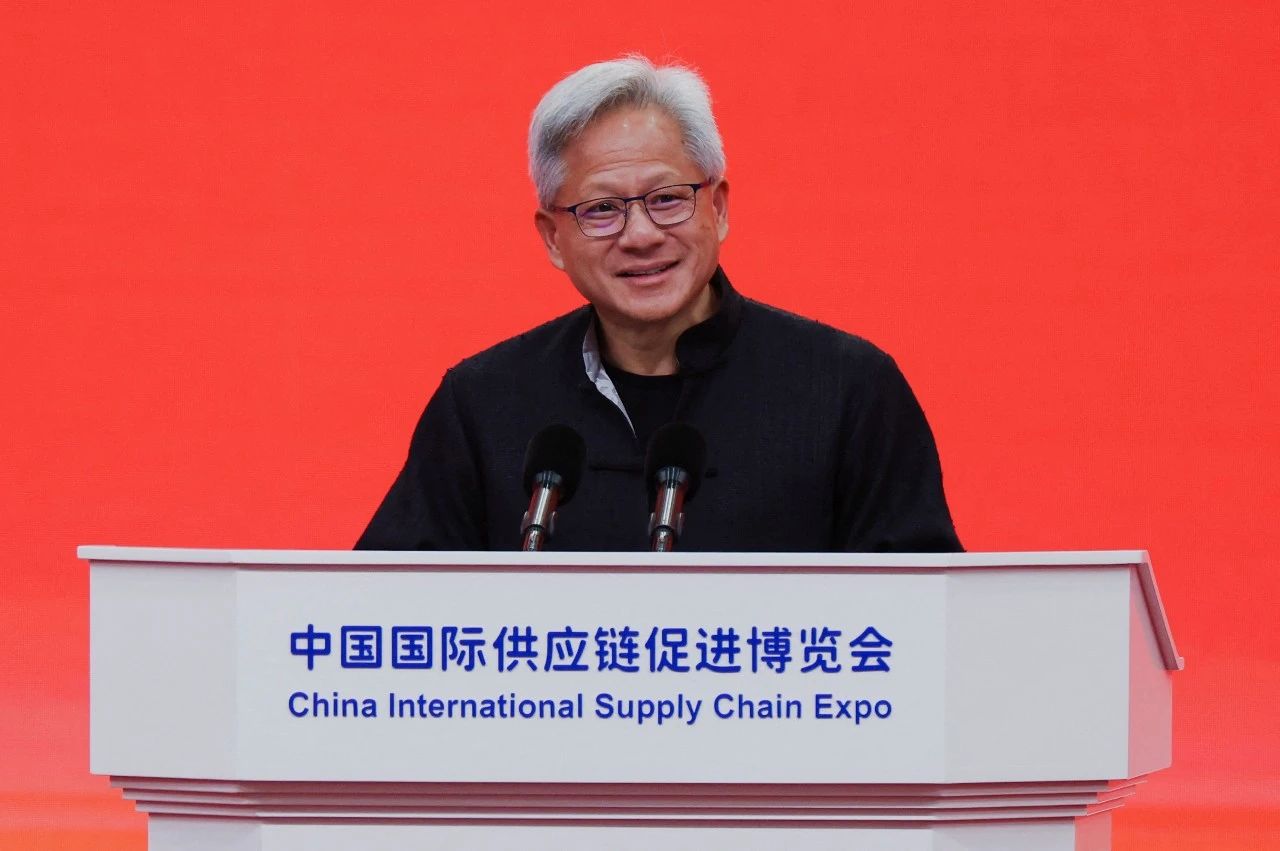C-Spot Replacement: Are Chinese Scientists Dominating the AI Era?!
![]() 07/25 2025
07/25 2025
![]() 508
508

Top talent remains the decisive factor in shaping the future landscape.
Article | Hua Shang Tao Lue Jin Yu
In the sweltering summer of 2025, Silicon Valley was ablaze with another fierce competition—this time, for Chinese AI talent.
Simultaneously, China's domestic AI industry was surging ahead at an unprecedented pace.
Beyond a mere "talent war," this was a revolution in industrial paradigms led by Chinese scientists, engineers, and entrepreneurs.
The global chessboard of AI is now entering a new era, where Chinese players hold the key pieces.
[01 Talent War]
In 2023, after parting ways with OpenAI, Musk founded the AI company xAI. On July 9th, he grandly announced the fourth-generation upgrade of xAI.
However, it wasn't Musk who stole the show at the conference, but two Chinese scientists—Wu Yuhuai and Jimmy Ba.
Born in Hangzhou, Wu Yuhuai is a "post-95s" academic prodigy who graduated from the University of New Brunswick in Canada with a perfect GPA and later earned a Ph.D. in machine learning from the University of Toronto under Geoffrey Hinton, the "father of deep learning."
Jimmy Ba, also a graduate of the University of Toronto, completed his undergraduate, master's, and doctoral degrees there and currently serves as an assistant professor in the Department of Computer Science. He is also a favorite student of Hinton.
After the conference, a group photo of the xAI team quickly went viral on social media. Strikingly, Chinese faces accounted for up to 80% of the group.

In fact, out of the 12-member founding team of xAI, five are Chinese scientists: Wu Yuhuai and Jimmy Ba, along with Yang Ge (a top student in Harvard's Mathematics Department), Dai Zihang (a graduate of Tsinghua's Computer Science Department), and Zhang Guodong (an alumnus of Zhejiang University's Electronics Department).
Yang Ge, hailing from Hunan, went to the United States for his studies in junior high school. He majored in Mathematics at Harvard University for both his undergraduate and master's degrees, studying under Professor Shing-Tung Yau. Upon graduation, he planned to join Google but was persuaded by Yau to join Microsoft Research instead.
Dai Zihang graduated from Tsinghua University's Computer Science Department and earned his Ph.D. in Computer Science from Carnegie Mellon University in 2020, after which he joined Google Research. He has deep experience in natural language processing (NLP), particularly in the optimization and innovation of Transformer architectures.
Zhang Guodong majored in Information Engineering at Zhejiang University and later pursued his master's and doctoral degrees at the University of Toronto. After joining xAI, his primary research focus is on improving AI training efficiency and model stability.
Today, the proportion of Chinese in Musk's team continues to grow, with Chinese scientists serving as the "brainpower" of xAI.
Even more enthusiastic about Chinese scientists than Musk is Mark Zuckerberg, Chairman and CEO of Meta, another Silicon Valley tech giant.
Currently, he is leading the fiercest "talent war" in Silicon Valley in a decade, with Chinese engineers as his primary target.
The first person he poached was Pang Ruoming, the head of Apple's foundational model team. According to Bloomberg, Pang Ruoming signed a whopping $200 million contract after switching to Meta. Shortly after, his deputy Tom Gunter and several core team members also followed suit and joined Meta.
According to insiders, Zuckerberg personally oversees the project code-named "Super Intelligence Lab," which targets the top 50 AI experts globally. One industry analyst privately described it as "a contemporary 'Manhattan Project,' except this time, the target is not physicists but Chinese AI experts."
Of the 14 people Meta has publicly announced as poached, as many as eight are Chinese, mostly from OpenAI and Google DeepMind.
The first batch of confirmed joiners to Meta includes Zhao Shengjia (a graduate of Tsinghua University), Yu Jiahui (a graduate of the University of Science and Technology of China's Young Gifted Class), Bi Shuchao (from Zhejiang University), and Ren Hongyu (from Peking University). They are all technical pillars behind OpenAI's core breakthroughs, such as GPT-4.1.
Wired magazine revealed that Meta offers top AI researchers a total compensation of $300 million over four years, with over $100 million payable in the first year, including high salaries, stocks, and signing bonuses. OpenAI CEO Sam Altman bluntly stated:
"Meta's treatment of AI experts is comparable to that of NBA stars or CEOs of Fortune 500 companies."
In addition, Google and Microsoft are also in action, with a focus on Chinese scientists. For example, Google poached He Kaiming, a top vision expert who graduated from Tsinghua University's fundamental science program in physics and holds a tenured position at MIT; while Huang Renxun poached two Chinese international students and promoted one of them to Vice President and Chief Scientist.
Behind the frenetic talent poaching lies Silicon Valley's growing anxiety.
The AI wave is gaining momentum, and top talent remains the decisive factor in shaping the future landscape.
When Meta poached Yu Jiahui from OpenAI with an annual salary of $100 million, OpenAI's Research Director Chen Xinhan angrily wrote in an internal letter, "It's like someone broke into our house and stole our most precious things."
To protect themselves, leading companies in Silicon Valley have "stepped up their game": Google DeepMind launched a "shadow compensation system"; while OpenAI allocated $4.4 billion for equity incentives, an amount exceeding 19% of its total revenue for 2024.
Chinese engineers are in high demand because they represent the "most scarce high-value resource" in the AI era. A joke on social media that "Chinese scientists are taking over Silicon Valley" is becoming a reality.
[02 Unique Advantages]
In fact, since the advent of ChatGPT at the end of 2022, the presence of Chinese researchers has become increasingly prominent on the global AI stage. Today, it is clear and certain to the global industry that researchers with a Chinese background have become the core intellectual pillars of leading AI institutions in the United States.
Particularly noteworthy is that while "Chinese scientists are taking over Silicon Valley," China's AI industry is also catching up, gradually surpassing, and taking the lead.
According to a report jointly released by the China Investment Promotion Office under the United Nations Industrial Development Organization (UNIDO) and Shenzhen Dongbi Data, 65 of the top 100 experts in the global AI field come from China. Among them, 50 work for domestic institutions in China, and 15 work for research centers in the United States.
Correspondingly, Chinese scholars also firmly occupy a high ground in terms of core AI achievements.
Stanford University's 2025 AI Index Report shows that the number of AI patents surged from 3,833 to 122,511 between 2010 and 2023, with a 29.6% increase in the past year alone. As of 2023, China leads in the total number of AI patents, accounting for 69.7% of all authorized patents.
The reason why Chinese scientists with a Chinese background can shine in the AI era is that the technological paradigm shift in the era of large models has amplified the comparative advantages of Chinese engineers. A Chinese engineer who has jumped between Meta and OpenAI shared, "They don't favor Chinese people, but they have recognized a reality: Chinese engineers are a triple guarantee of efficiency, stability, and innovation."
From chips to models, from hardware-driven to algorithm-driven, the core of AI competition has shifted to algorithm design, architectural innovation, and data understanding. These are precisely the strengths of Chinese engineers.
Behind this are both systematic pushes from education and policy and deep assistance from culture and social psychology.
First is the drive of national strategy. In 2018, China issued the "Innovation Action Plan for Artificial Intelligence in Institutions of Higher Learning," comprehensively launching systematic training for AI talent. To date, 535 universities nationwide have established AI majors.
China's long-term accumulation in basic mathematics education has continuously supplied "underlying computing power" to the AI field. In the International Mathematical Olympiad (IMO), the Chinese team has won the world championship 15 times, leading the globe with a solid foundation in mathematical ability.
The close cooperation between China's top universities and enterprises such as Alibaba, Baidu, Tencent, and Huawei, as well as the joint establishment of laboratories and research platforms, and the booming development of China's emerging tech industry, also provide support for talent cultivation.
According to statistics, China currently has over 4,500 AI enterprises, and many entrepreneurs are graduates of top universities such as Tsinghua, Peking, and Zhejiang universities. Behind emerging institutions like Baichuan, MiniMax, Moonshot, and Zhipu, there are often scholars who still retain their teaching positions, running both academic and commercial lines to form complex research teams.
In early 2025, the domestic large model DeepSeek was launched, and within just one month of its launch, its cumulative downloads exceeded 110 million. It's worth mentioning that DeepSeek achieved rapid popularity among domestic and foreign users without any marketing investment;
In May, Huawei officially delivered its new-generation AI chip Ascend 910C to domestic customers, outperforming NVIDIA's H20 chip in performance. In specific scenarios, its performance is close to 80% of the H100, but at half the cost. This breakthrough not only significantly improves the cost-effectiveness of domestic computing power but also breaks the long-term monopoly of American chips in key technologies;
At the same time, unicorn tech enterprises are also achieving revolutionary breakthroughs in their respective fields. The Dark Side of the Moon pioneered the "long-text revolution," with its Kimi intelligent assistant supporting up to 2 million words of context processing.
Moreover, cultural cognition and social psychology are also reasons why AI is more respected and promoted in China.
A recent report from Stanford University points out that only 39% of Americans believe that the benefits of AI outweigh the drawbacks, while in China, this proportion is as high as 83%. This strong "technological optimism" continuously fuels the AI industry with talent and enthusiasm.
Behind the takeover of Silicon Valley by Chinese scientists is the result of a large number of Chinese students going to the United States to study related majors. Even in the face of tightened visa policies and enrollment restrictions, the number of Chinese students in science and engineering Ph.D. programs is still more than twice that of Indian students.
[03 Reshaping the Rules]
Besides becoming the focus of competition for large companies as scientists and occupying high positions, in the new AI era, Chinese talent, both domestic and overseas, is also constantly achieving new heights in entrepreneurship.
In July 2025, when Google bought the AI programming startup Windsurf and its core team for $2.4 billion, Cognition, another AI programming startup led by Chinese entrepreneur Scott Wu, swiftly moved to acquire the remaining team and intellectual property of Windsurf within 72 hours.
This surprise merger was dubbed the "Lightning Action" by the Silicon Valley industry.
Scott Wu is a post-90s Chinese entrepreneur who won three gold medals at the International Olympiad in Informatics (IOI) when he was only 15 to 17 years old, earning him the title of "prodigious youth."
In March 2024, Cognition, founded by Scott Wu, launched "Devin, the world's first AI programmer," and became an overnight sensation. A year later, the company completed a $175 million Series A funding round, with a valuation of up to $2 billion.
An even more exciting game is playing out in the field of big data annotation.
In mid-June 2025, Meta announced the acquisition of a 49% stake in Scale AI for $14.3 billion. The founder of Scale AI is Wang Tao, a 28-year-old Chinese scientist. After Meta completed the acquisition of Scale AI, Wang Tao, now worth $2 billion, will step down as CEO of Scale and become Meta's Chief AI Officer, leading the construction of a system for "AI superintelligence."
Among Silicon Valley's AI startups, compared to Scale, its rival Surge AI is now attracting more attention and curiosity.
Surge AI has been established for five years. It has never raised funds and rarely communicates publicly. It is said to have only one-tenth of Scale's employees but achieved revenue of $1 billion in 2024. Its founder is also a Chinese national—Edwin Chen.
Edwin Chen graduated from MIT with a degree in Mathematics and Linguistics and has worked at Google, Facebook, and Twitter, focusing on machine learning, human-computer interaction, and content moderation. After founding Surge AI, he positioned the company around a "high-quality human data platform," precisely targeting the large model annotation segment.
While these Chinese entrepreneurs are showcasing their wisdom in Silicon Valley, domestic entrepreneurs in China are also breaking the traditional order and becoming rule-makers rather than rule-takers in the new AI era.
When China's open-source model DeepSeek matched ChatGPT's performance at one-thirtieth the cost, the giants of Silicon Valley also understood the significance behind it.
On July 16th, NVIDIA CEO Huang Renxun appeared in Beijing, rarely shedding his iconic leather jacket for a Tang suit and delivering a speech in Chinese for the first time. In his speech, he described China's AI market as "vibrant" and mentioned that more than 50% of global AI researchers are in China, collectively creating a "miracle" for China's AI.

He asserted, "Chinese developers and entrepreneurs are propelling rapid innovation in AI, with an impressive one million developers now actively engaged in this field. Companies such as DeepSeek, Alibaba, MiniMax, and Baidu are crafting world-class products that are propelling the global AI landscape forward."
He further revealed that the United States had granted approval for NVIDIA to sell H20 chips to China on July 15th, yet the Chinese industry has not blindly embraced this development. Many believe that China should continue to propel the AI process with its own indigenously developed chips.
Even the U.S. Treasury Secretary conceded that the approval of NVIDIA was a testament to the fact that China's independent chips have already matched or even surpassed the performance of H20 chips.
This marks a significant shift in the rules of the game.
An even more profound change is the trend of Chinese scientists returning to China to launch their businesses in the AI era.
Zhu Songchun, a renowned AI scholar from the University of California, Los Angeles, has returned to China to establish an AI research institute. Zeng Wenjun, the former chief scientist of Microsoft Research Asia, has joined Ningbo Dongfang University of Technology. Qi Guojun, an award-winning AI expert who spent over a decade in the United States, has also returned to China and joined Westlake University to establish the "MAPLE Lab."
Among emerging AI enterprises like Baichuan, MiniMax, and Dark Side of the Moon, a significant number of Chinese research leaders with overseas backgrounds can be observed. Together, they form an emerging "return force" that is driving the rapid advancement of China's AI in algorithm open sourcing, model innovation, and large-scale training.
In this global competition of technological prowess, Chinese scientists, engineers, and entrepreneurs are no longer merely technical backbones "poached" by Silicon Valley with lucrative salaries. Instead, they are the new generation of "helmsmen" and rule makers. AI is ushering in the:
Era of the Chinese.
[References]
[1] "Who is the Chinese person next to Musk at the Grok4 conference?" 21st Century Business Herald
[2] "Zuckerberg is determined to build an AI super team" FORTUNE Magazine
[3] "Chinese AI talent: Can they compete with the US?" AInvest
[4] "AI talent war: People are always more important than machines" Economic Observer
——END——
Welcome to follow [Huashang Taolue] to recognize influential figures and read tales of strategy.
All rights reserved. Private reprinting is prohibited.
Some images are sourced from the internet. If infringement is involved, please contact us for deletion.







